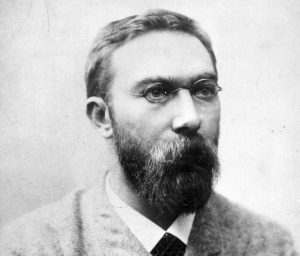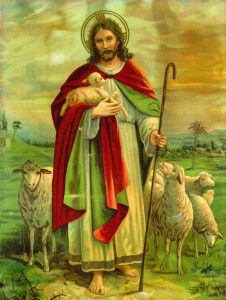Words on the Word
Good Shepherd Sunday
Homily at a Confirmation Mass.
Acts 13.14-52: We must turn to the pagans.
Acts 7.9-17: They stand before the throne and before the Lamb.
John 10.27-30: My sheep hear my voice.
The iconography of piety can make the Good Shepherd, an important motif in Scripture, seem remote, perhaps a little disagreeable. The shepherd presupposes the flock; and being likened to sheep, be they Biblical, does not flatter us. Further, we are used to seeing the shepherd carry a lamb, the hundredth, lost one supposed, the point isn’t lost on us, to represent us.
Now, once in a while we may feel like being carried in this way, when we’ve really made a mess of things and feel powerless. But in general we do prefer to walk on our own, to find our way with our own strength, to experience that we’re good for something. The image of the shepherd can seem to disenfranchise us. And we start wondering: is this what Christianity is about, becoming an animated ball of wool carried on draped shoulders into a pastel-hued sunset? This impression conditioned my own religious formation. For this is how, as far as I remember, the Gospel was presented to me the one and only time I attended Sunday School. I was appalled. When the lesson was over I marched home and declared to my parents with all the authority of my eight years: ‘Never again!’ I never did go back.
Only much later, when I started studying the Bible — and discovered what a fascinating, magnificent book it is — did I realise that the shepherd in fact stands for something rather different. Of course, ancient Israel was nomadic. People did not settle in one place. They moved around seeking favourable conditions for themselves and their flocks, which were their livelihood. A shepherd was exposed to risks: inhospitable nature, wild animals, bandits. The image par excellence of the Old Testament shepherd is David. When as a young man he faced Goliath, a trained guerilla warrior, he told King Saul, to prove himself fit for single combat:
Your servant used to keep sheep for his father; and when there came a lion, or a bear, and took a lamb from the flock, I went after him and smote him and delivered it out of his mouth; and if he arose against me, I caught him by his beard, and smote him and killed him. Your servant has killed both lions and bears (1 Samuel 17.34-6).
That is a rather different kind of shepherd profile. Such experience equipped David for a political career. For the Lord, we read in a Psalm, ‘took him from the sheepfolds; from tending the ewes that had young, he brought him to be the shepherd of Jacob his people, of Israel his inheritance’ (Psalm 78.71). The Christ-image in the parable of the shepherd does not suggest a chilled hippie pursuing an alternative lifestyle. It suggests a profile of clear strategy, courage, and a spirit of sacrifice, qualities we look for in a trustworthy leader.
When we turn to the Gospel we have just read, we find that it’s about trust above all. ‘My sheep hear my voice’, says the Lord: ‘I know them, and they follow me.’
All of us know what the sound of a beloved person can signify. Think of an infant who does not yet grasp what is being spoken around it, but who relishes the voice of its mother nursing it, caring for it, protecting it. Our Norwegian poet Per Sivle wrote a poem 150 years ago that begins with the words: ‘The first song I ever heard/was that of my mother at the cradle‘. He describes how remembrance of that song penetrated under his skin, becoming a symbol for the comfort we all long for when we’re afraid. The last stanza of the poem reads: ‘When weary I tire/in combat against what wrecks/I hear, quietly, from my mother’s grave/the song that can heal all things.’ Sivle lost his mother at the age of three and spent his childhood being moved from one foster home to the next. Bearing that in mind, we are alerted to the pathos of his text. That helps us to ask: Whose voice carries for me such promise?
We know, too, what threatening voices do to us — when we think of someone who has hurt us, perhaps, or taunted us at school or at work, belittling us. The resonance of a scornful, dangerous voice gives us goosebumps and sets our pulse racing.
At times we may find that life is like a vast resonant room in which threatening and comforting voices outshout, or outwhisper, one another. We must choose, then, which to follow. We must know how to tell the voices apart.
Today, my friends, you will receive ‘the seal of God’s gift, the Holy Spirit’. Thereby you are greatly helped in the work of voice discernment. The Spirit is the Spirit of Jesus, the Risen One. It conveys his presence and his power. It calls to mind all he has said. The Spirit teaches us what it means to live in Christ. The more we get used to living thus, the more clearly we shall know his voice. That does not necessarily mean that we will receive a lot of very specific instructions. God does not absolve us from thinking and working things out. But he helps us to think clearly.
The shepherd’s task is to lead the flock. The voice of Jesus guides us forward so that we, before the crossroads of life, where we must make essential choices, choose well and so can move forward towards goals corresponding to our true desires, where we shall find freedom and the joy of giving ourselves for something great; in other words, we shall learn to love. For the basic principle of love is not self-satisfaction, it is self-giving. It is paradoxical but true: Only by giving ourselves do we discover who we really are. I become myself when I freely say Yes! to another.
The fourth Sunday of Easter is known as Good Shepherd Sunday. It is a devout custom on this day to pray for vocations. When we hear the word ‘vocations’ the chances are we think of the call to be a priest or a religious. We do need such, and consecrated life is a wonderful adventure that can lead to great happiness: take my word for it! All young Catholics should ask themselves at some point: ‘Might I be called to serve in such a way?’ But of course the notion of vocation is broader, more variegated. God has a purpose in mind, not just for priests, monks, and nuns, but for all his children. Each of you has a vocation in the sense that a task is awaiting you that will correspond to your particular giftedness, which will let you attain your full measure. Use the grace you receive today to ask: ‘Lord, to what do you call me? Where do you need me?’ Then, follow the shepherd’s voice. It is trustworthy. It will lead you into landscapes that surpass your expectations.


